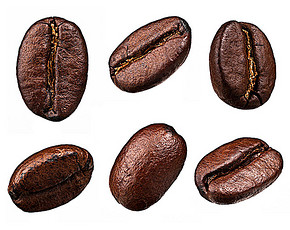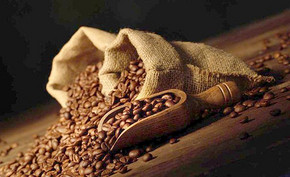Description of growing Flavor in Coffee producing areas of Tanzania
Follow the caf é (Wechat official account vdailycom) and found that Beautiful Cafe opened a small shop of its own.
Tanzania's Kilimanjaro coffee, with its soft acidity and attractive aroma, has long been loved by Europeans and ranks among the world's most famous coffee products. Europeans give Tanzanian coffee the nickname "coffee gentleman", and Chinese coffee connoisseurs call it the "coffee swordsman" with the mocha of the "King of Coffee" and the "Lady of Coffee".

Mount Kilimanjaro in Tanzania is 5895 meters above sea level and connected to Mount Meru. It is the main production base of Kilimanjaro coffee. Mount Kilimanjaro is the highest peak on the African continent and the only snowy peak on the earth located on the equatorial line. It is "the roof of Africa" and "Snow White on the equator". The rich volcanic ash gives the coffee here a strong texture and soft acidity, with the characteristics of typical African coffee beans. Kilimanjaro AA is the highest grade coffee bean with high quality in all aspects. Medium or more moderate after baking has a strong aroma. It is suitable for use as a single product or iced coffee.
Tanzanians still maintain a lot of coffee tradition, and most of the time they collect ripe and fallen fruit under coffee trees, which will somewhat damage the quality of coffee. They have been using the sun method to treat the coffee beans, rarely using the water washing method, which allows the coffee beans to absorb the aromatic substances of the flesh, so the fruit flavor is stronger.
Kilimanjaro coffee is very characteristic, it emits delicate aroma, and contains wine and fruit aromas, people taste endless aftertaste, from the appearance is very similar to Kenyan coffee, the overall taste is more similar to Sumatra Kalou coffee. After drinking Kilimanjaro coffee, I always feel a soft and mellow earthy smell around my mouth. Coffee gourmets often use words such as "wild" or "wild" to describe it. It can be said that pure Kilimanjaro coffee is "the most African coffee".
Coffee is one of the main cash crops in Tanzania, ranking fourth after cotton, tobacco and cashew nuts, mainly sold to Italy, Japan and the United States. Coffee exports play an important role in the national economy of Tanzania. Tanzania's main coffee-producing area, located at the foot of Mount Kilimanjaro, is rich in volcanic soil. Some coffee trees are more than 100 years old. Coffee was first introduced and planted by Christians from Kenya. Coffee trees must be carefully cared for, weeded, fertilized, and old branches must be cut off so that new branches can grow to maintain the quality of coffee beans. The processing plant is located in a nearby town at the foot of the mountain, making it easy to handle coffee beans nearby. Many of the farm owners' families have lived here for generations of immigrants, including Indians, Scandinavians, British, and, of course, locals, but most of them are small farms. however, the managers of farms and processing farms are mostly local people. Labor in Tanzania is cheap, so much of the work of pruning and maintaining coffee plantations in Tanzania depends on manual processing rather than machines. During the coffee growing season, the job of coffee workers is to manually check to remove the leaves of some sick or growing insects. Coffee processing in Tanzania is highly dependent on labor, but it also brings jobs to locals and increases household income. Workers earn their wages by harvesting the amount of coffee fruit, and small farm women use their hand-made sacks to bring coffee fruit to the farm to calculate the money.
The coffee beans produced here are all exported from Kilimanjaro, but apart from Mount Kilimanjaro, there are several major coffee-producing areas throughout Tanzania, there are more small farms in other areas, and most small farms also have a planting area of several hundred mu. Some have their own washing equipment and drying farms, but graded treatment still has to go through large-scale treatment plants. Tanzania has considerable historical experience in growing coffee, and even small farms can handle good quality coffee beans.
Important Notice :
前街咖啡 FrontStreet Coffee has moved to new addredd:
FrontStreet Coffee Address: 315,Donghua East Road,GuangZhou
Tel:020 38364473
- Prev

The origin of Jamaican blue mountain coffee beans, a brief introduction to blue mountain coffee
Following Cafe Review (Wechat official account vdailycom) found that Beautiful Cafe opened its own shop. The top coffee in the world is Blue Mountain Coffee, which is regarded as a treasure because of its low output. This precious coffee is named after a mountain in eastern Jamaica, which is surrounded by the sea. In fine weather, the sun shines on the blue Caribbean Sea.
- Next

Tanzania coffee beans taste aroma variety introduction
Coffee taste: Tanzania is a typical East African country, bordering Kenya and Uganda in the north, Malawi, Mozambique and Zambia in the south, Rwanda and Burundi in the west. Many people like to compare Tanzanian coffee to their Kenyan neighbors. Compared with Kenya's good coffee beans, Tanzanian coffee has less bright acid and more gentle beauty.
Related
- Detailed explanation of Jadeite planting Land in Panamanian Jadeite Manor introduction to the grading system of Jadeite competitive bidding, Red bid, Green bid and Rose Summer
- Story of Coffee planting in Brenka region of Costa Rica Stonehenge Manor anaerobic heavy honey treatment of flavor mouth
- What's on the barrel of Blue Mountain Coffee beans?
- Can American coffee also pull flowers? How to use hot American style to pull out a good-looking pattern?
- Can you make a cold extract with coffee beans? What is the right proportion for cold-extracted coffee formula?
- Indonesian PWN Gold Mandrine Coffee Origin Features Flavor How to Chong? Mandolin coffee is American.
- A brief introduction to the flavor characteristics of Brazilian yellow bourbon coffee beans
- What is the effect of different water quality on the flavor of cold-extracted coffee? What kind of water is best for brewing coffee?
- Why do you think of Rose Summer whenever you mention Panamanian coffee?
- Introduction to the characteristics of authentic blue mountain coffee bean producing areas? What is the CIB Coffee Authority in Jamaica?

